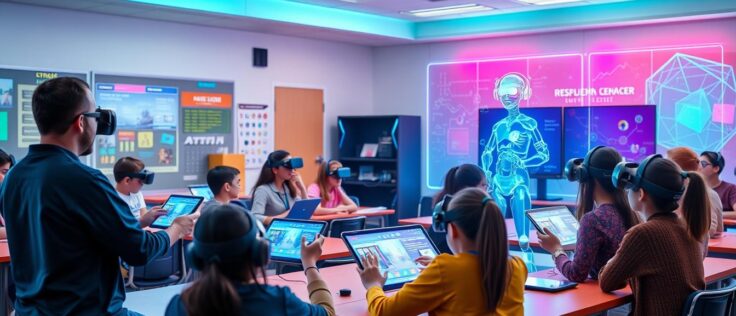As Artificial Intelligence begins a new chapter across various fields, its impact on education is monumental. It’s bringing a significant change in how we gain and use knowledge. Nowadays, AI in education is a current reality. It is pushing a quiet change in how we teach, with the e-learning market set to soar by 20301.
AI is making learning more personal and engaging. It keeps the core of teaching alive but ensures education is more tailored and reachable for everyone. Through AI, educators can understand each student’s unique needs better. This opens up endless possibilities for custom learning2. Being able to work with smart systems is becoming an essential skill.
Despite our world becoming more digital, classrooms have mostly stayed the same. But now, the tide is changing. In the U.S., 60% of teachers are now using AI technologies as of October 20231. Clearly, those who know how to use AI are leading the way. This shows the need for education to keep up with technology3.
AI is also making learning more fun and engaging. Gamification and platforms like Google Classroom make subjects more interesting for each student. They offer customized challenges1. Moreover, AI helps schools rethink traditional degrees. They’re adapting to a world where learning throughout life is key3.
The UK knows how crucial AI in education is for the future. Schools are teaching vital skills like problem-solving and digital literacy. This prepares students for a job market deeply linked with AI1.
Transitioning to Tech-Enhanced Learning
Education is changing fast, with EdTech and smart AI becoming big parts of it. These innovations make online learning better and help virtual classrooms grow. They can even make students 30% more engaged and successful4.
AI is great at gathering data about how students learn, helping teachers a lot. With AI, students are 20% more likely to finish their courses. It also lets teachers save up to 40% of time spent on regular tasks4.
New teaching tools are leading to big changes in education. They make learning very personal and can predict student needs. With AI, every student gets help, like having their own online tutor4.
This need for new teaching methods is clear as online learning becomes a key part of education. AI and online tutors are creating a modern way of learning, for the benefit of both students and teachers4.
The Digitalisation of Traditional Classrooms
The landscape of education is undergoing a significant change as digital tools become part of traditional classrooms. This change is driven by the growing use of Education Technology. It’s changing old teaching methods, making learning more interactive and engaging.
Impact of AI Tools in Education on Conventional Teaching Methods
AI Tools in Education are playing a key role in moving from old teaching methods to new, flexible ways. This change promotes teamwork and creates custom learning paths5. AI platforms like DreamBox and MATHIA are making learning better by offering custom experiences. These tools help meet various learning needs, improving how engaged students are and their results6.
Personalised Learning through AI-Enabled Platforms
Personalised Learning is leading the way in educational innovation, thanks to AI in adaptive learning. AI helps understand different learning styles and tailor content accordingly6. This method moves past the old one-size-fits-all approach, making each student’s learning journey unique. It not only improves learning but also creates a welcoming environment for all. Using digital tools is key to making technology accessible to everyone5.
The combination of AI Tools in Education and personalised learning will keep improving. This move is good for students as it offers high-quality custom learning. It also helps teachers by giving them advanced tools to be more effective.
AI in Education: Beyond the Hype
The teaching world is changing, and AI’s role in education is a hot topic. Rather than fearing that machines will take over teaching jobs, AI helps teachers do their jobs better. This means giving each student a learning experience that’s just for them.
Dismantling Myths About AI Replacing Educators
Many people worry AI will take over teaching, but this isn’t true. AI is here to help, not replace, the unique human aspect of teaching. For example, a 2021 study showed AI boosts teaching methods, not takes away jobs7. It’s important to overcome fears of AI, similar to past fears about calculators and the internet, to welcome technology in education8.
Supplementing Teachers with Intelligent Systems
AI support for teachers isn’t just about making jobs easier. It also helps understand students better. With deep insights into student behaviour and learning, teachers can enhance their teaching. This creates a better learning space for every student, encouraging growth7.
In the end, the fear of AI replacing teachers is overshadowed by the positive reality. AI serves to empower the education world and its teachers. It helps them reach higher in their careers and brings more satisfaction to their roles.
Measuring Learner Progress with AI
Using AI to check student progress helps a lot in improving learning and achievement. Tools like Zoomi help teachers analyse a lot of data quickly and make better decisions. It’s important to use data carefully to keep education places safe9.
When adding AI in learning, schools must still focus on the human side of teaching. Things like emotions and ethics should lead the use of AI. This makes sure we improve students’ achievements without losing the value of human touch and advice9.
Curriculum Development and Adaptive Learning
AI-Driven Insights for Curriculum Design
This change ensures curricula meet high adaptability standards. They also evolve with new educational trends and workforce needs10.

Adaptive Learning Systems Tailored to Student Needs
Adaptive learning systems show AI’s potential for personalising education. They adjust content based on each student’s interactions. This promotes educational adaptability for all learning styles11. These systems feature competency-based learning and differentiated instruction. Both are key in increasing learner engagement and retention11.
The mix of AI insights in curriculum design and adaptive learning tech moves us towards personalised education. It helps students reach their fullest potential in a changing educational scene.
The Personal Touch: AI Tutors and Their Roles
AI tutors have brought a big change to online learning. They provide custom teaching that understands and adjusts to each student’s needs. These systems are not just changing how students learn. They’re making education better by giving focused help that suits how and what pace each student learns. This really helps students learn more effectively and remember more of what they learn1314.
AI tutors go beyond just teaching subjects. They help with emotional and mental challenges too. They change how they teach based on how a student feels. This means not only does a student learn more, but they also get support that cares about their feelings14. This kind of complete support is key in the varied world of online learning.
What’s more, AI tutors can reach students all over the world. They make high-quality education available to many more people. This is important for closing the gap in education and giving everyone the same chance to learn, no matter where they are or their background. Yet, there are still hurdles like keeping everyone’s data safe and making sure technology reaches everyone14.
The tech behind AI tutors keeps getting better. This means they’ll play a bigger part in how we learn online. What’s coming will not only improve personalized learning but also change what we expect from tutors online. With AI tutors, personalized teaching is reaching new levels of success and being welcomed by more and more people14.
Boosting Student Engagement and Retention
Using AI in education boosts student interest and enables tailored learning. AI-driven games make lessons more exciting, catching students’ attention. This leads to better focus and higher memory of what is learnt.
Gamification and Interactive Learning with AI
With AI, learning becomes a game, making education more appealing. These techniques help keep students engaged, even online. AI creates custom learning experiences, improving focus and knowledge retention1516. AI tools also monitor progress and adjust lessons to fit each student’s abilities, boosting their learning success16.
Sustaining Attention in Virtual Classrooms
Considering the ethical sides of replacing jobs with AI, schools play a big role in getting students ready for tech changes. It’s crucial to use AI in teaching to not just attract but also empower learners.
Embracing AI-Driven Education Technology in Schools
Schools that use AI are leading in educational innovation today. They’re changing how students learn, teachers teach, and how courses are evaluated. With AI, learning becomes personalised and management gets simpler, making education more effective and efficient.
Experts globally see AI’s significant role in student evaluation. At a conference in Manchester, two educational leaders shared how AI is changing exams. They talked about more engaging and relevant assessment methods18.
AI allows schools to give feedback that’s more customised and helpful. It checks essays and arguments, boosting thinking and analysis skills. This improves both grading accuracy and student learning18.
In conclusion, AI in education matches today’s digital trend perfectly. It’s building a strong basis for future education. As AI technology develops, its use in teaching and management will grow, making it a key part of learning soon.
Bridging the AI Skills Gap in the Workforce
The future job landscape is clearly heading towards an era dominated by AI. This makes being prepared for AI not just an advantage, but a basic need. As tech becomes part of every sector, the gap in AI skills is a big concern. We need to focus on teaching current workers new skills. This will help them be confident with future technologies.
AI Readiness as a Prerequisite for Future Jobs
AI is vital in teaching new skills for the future. It’s not just about coding or machine learning. It’s also about readying our minds to use, create, and benefit from AI technology. For example, Microsoft uses VR to make training more immersive than old methods19.
Corporate training must keep up with AI’s fast growth. It should focus on both tech skills and people skills like leadership19. Skills in problem-solving and talking well are as needed as tech knowledge. This mix helps build a place of work ready for an AI future. Companies offering AI-centered learning will see big benefits. They’ll create a more flexible and strong workforce19.
To get ready for what the future holds, we need to wholeheartedly adopt AI readiness. Continuous learning and being able to change is key. Schools and businesses need to make sure they’re ready for new job demands. This will help close the gap in AI skills effectively.
AI in Education: The Big Picture
Education Technology is swiftly evolving, with Artificial Intelligence (AI) playing a key role. It shapes how we learn, bringing tools like Learning Analytics, AI ethics, and digital fairness. This evolution expands educational chances for all, making learning more inclusive.
Incorporating AI Principles in Learning Analytics
AI is transforming Learning Analytics by making data collection and analysis smoother. It leads to customized learning experiences and better results by finding learning trends. A striking 88% of teachers see the value in having data insights21. Also, 68% of UK educators acknowledge AI’s benefits despite some risks21, showing an optimistic attitude towards AI.
Education Technology as a Catalyst for Inclusive Learning
AI-driven Education Technology leads the charge in pushing for Inclusive Learning. It offers adaptive resources, like speech-to-text and personalized lessons. These help students from various backgrounds, including neurodiverse ones. Digital equality is growing, reported by 63% of school and 59% of language teachers seeing AI’s positive effect21.
AI aids in making education more accessible by tailoring it to individual needs. Firms like Alelo use AI to give specialized language learning, improving education for everyone22.
For insights into AI’s role in enhancing customer relations in education through CRM, read more here.
Conclusion
The introduction of Artificial Intelligence (AI) in education is creating a huge shift towards an AI-driven learning society. It aims to provide personalised lessons and learning experiences for everyone. This means AI can adjust what you learn and how you learn it, based on your own style and progress. This approach helps all students get a fair chance to do well23.
AI is also breaking down old barriers in education. It gives you feedback right away so you can see where to improve. Plus, there are AI tutors available any time you need help. This is changing the way we learn and opening up new chances for success across the globe23. But there’s a problem – not everyone has the same access to these tools24. It’s up to those in charge to make sure AI tools are available to everyone, so no one is left behind2324.
AI isn’t here to take over teachers’ jobs. Instead, it’s here to help them focus on what’s most important: teaching and inspiring students. By taking care of the repetitive tasks, teachers can spend more time doing what they love. In the end, AI in schools prepares us all for a world filled with technology2324.
FAQ
How is Artificial Intelligence shaping the future of education?
Artificial Intelligence is changing how we learn by making study times personal and engaging. It uses data to improve teaching and offers AI tutors for tailored help. Teachers still play a key role in guiding students.
What role do AI algorithms play in education?
AI algorithms are very useful in both online and classroom settings. They provide detailed reports on how students interact with materials. This helps point out tricky areas, making learning more personalised and improving results.
What impact do AI tools in education have on conventional teaching methods?
AI tools are refreshing the old ways of teaching. They enable teachers to customise lessons to fit each student’s needs. This results in a more adaptable and effective way of learning.
Can AI replace educators?
AI isn’t here to take the place of teachers. Instead, it helps by taking over some tasks and offering insights into how students are doing. This teamwork enhances personalised learning without losing the human touch.
How does AI help in measuring learner progress?
AI plays a big role in tracking how students are doing through detailed analytics. It spots patterns and predicts needs, enabling teachers to offer the right support and monitor progress accurately.
What are adaptive learning systems?
Adaptive learning systems adjust content based on how a student performs. They keep learning paced right for each person, making sure students stay focused and get the help they need.
What is the role of AI tutors in personalised learning?
AI tutors customise their teaching to match each student’s learning style. They are key in offering personalised content and help with learning strategies. This makes online learning more tailored and effective.
How does AI boost student engagement and retention?
AI boosts engagement by adding fun, interactive elements to learning. It provides instant feedback in digital classes, keeping students interested and helping them remember more.
Why are schools embracing AI-driven education technology?
Schools are adopting AI in EdTech to make learning more personal and efficient. It helps with admin duties and offers valuable insights. This move helps schools prepare students for a digital future.
How important is AI readiness for future employment?
Being ready for AI is vital as it becomes a big part of many jobs. Schools need to teach AI skills to help students succeed in the evolving job market.
How does integrating AI principles in learning analytics support education?
Using AI in analytics helps teachers understand student needs and refine their teaching. It ensures content suits everyone, aiding in fair and personalised education.
How does education technology promote inclusive learning?
EdTech uses AI to support students with different needs through special features. It makes learning accessible to everyone, creating a more inclusive education environment.
Source Links
- How AI is Shaping the Future of Education – https://esoftskills.ie/how-ai-is-shaping-the-future-of-education/
- How Artificial Intelligence Is Shaping the Future of Education – https://www.pcmag.com/news/how-artificial-intelligence-is-shaping-the-future-of-education
- How AI Is Shaping The Future Of Education – https://www.forbes.com/sites/ronschmelzer/2024/05/28/how-ai-is-shaping-the-future-of-education/
- AI in Education: Transforming Learning and Teaching – https://medium.com/@aitechdaily/ai-in-education-transforming-learning-and-teaching-1996ec2abc00
- Digital Transformation in the Classroom: Gisma’s Approach to Modern Education – https://www.gisma.com/blog/digital-transformation-in-the-classroom-gismas-approach-to-modern-education
- PDF – https://kuey.net/index.php/kuey/article/download/5812/4139/11907
- Unveiling the shadows: Beyond the hype of AI in education – https://www.ncbi.nlm.nih.gov/pmc/articles/PMC11087970/
- OII | Moving beyond the hype — AI in education – https://www.oii.ox.ac.uk/news-events/moving-beyond-the-hype-ai-in-education/
- AI-Driven Evolution in Learning Analytics for Digital Education – https://www.digitallearninginstitute.com/blog/ai-driven-evolution-in-learning-analytics-for-digital-education
- AI in Curriculum Development: Tailoring Learning Paths – https://redresscompliance.com/ai-curriculum-development/
- 10 Ways Artificial Intelligence Is Transforming Instructional Design – https://er.educause.edu/articles/2023/8/10-ways-artificial-intelligence-is-transforming-instructional-design
- Adaptive Learning AI Technology in Education – https://belitsoft.com/custom-elearning-development/ai-in-education/adaptive-learning-ai
- The Role of AI in Personalised Education: Exploring the Potential of ChatGPT – https://www.tutordoctor.co.uk/blog/2023/september/the-role-of-ai-in-personalised-education-explori/
- AI in Education: The Rise of AI Tutors and the Future of Personalized Education – https://www.linkedin.com/pulse/ai-education-rise-tutors-future-personalized-jamie-culican
- Role of AI in student engagement and Retention – – https://www.xevensolutions.com/blog/role-of-ai-in-student-engagement-and-retention/
- The Synergy of AI and Education: Opportunities and Challenges – https://vasscompany.com/nordics/en/insights/blogs-articles/ai-education/
- Teacher Perspective: Embracing AI in Education – OLC – https://onlinelearningconsortium.org/teacher-perspective-embracing-ai-in-education/
- The future of assessment: embracing AI and EdTech – Jisc – https://jisc.ac.uk/blog/the-future-of-assessment-embracing-ai-and-edtech
- Bridging the Skills Gap: The Role of AI in Workforce Education – https://trainingindustry.com/articles/artificial-intelligence/bridging-the-skills-gap-the-role-of-ai-in-workforce-education/
- AI in Education: Bridging Skill Gaps and Boosting Learning – Service Desk Institute – https://www.servicedeskinstitute.com/ai-in-education-bridging-skill-gaps-and-boosting-learning/
- AI in education: where we are and what happens next – Oxford University Press – https://corp.oup.com/feature/ai-in-education-where-we-are-and-what-happens-next/
- Is education ready for artificial intelligence? – https://www.cambridgeassessment.org.uk/insights/is-education-ready-ai-rose-luckin/
- AI In Education Sector: Benefits, Use Cases, The Future | Yellow – https://yellow.systems/blog/ai-technology-in-education
- AI in Education: Expert Discussions on Shaping the Future of Learning – https://www.linkedin.com/pulse/ai-education-expert-discussions-shaping-future-learning-cobo-ac6ue






